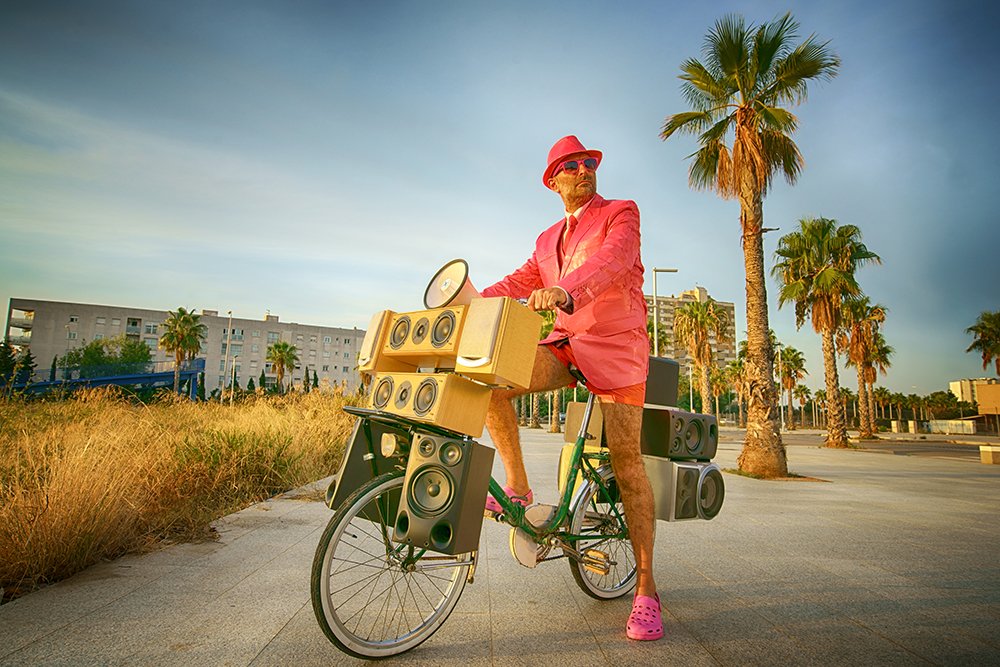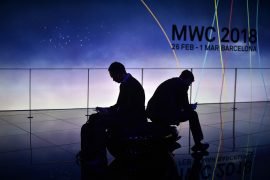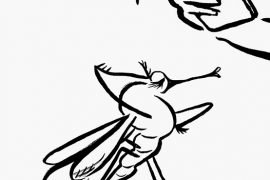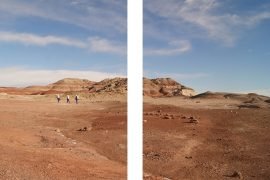[dropcap letter=”I”]
t was not easy to arrange a conversation with Joan Miquel Oliver. After several cancelled appointments, we caught him at Barcelona’s El Prat airport, half way through a return stopover between Lleida in western Catalonia and Palma in Majorca. And precisely, in his new album Elektra, there is a piece that speaks of the city of Lleida. It’s called Me’n vaig a viure a Lleida—I’m going to live in Lleida. According to the author, “I wrote this song on October 2 last year after the police charges in Catalonia. I was in Barcelona, I saw them, and freaked out. The next day, after getting home, talking about it with a friend, he said to me: it’s all shit, I’m going to live in Lleida… I’m going there, I want to live alone and I want to forget about all that.” I thought his “I’m going to live in Lleida,” was rather funny, as if Lleida were Mars. And I wrote a tune about that unfortunate day.”
Elektra closes a trilogy begun in 2015 with Pegasus, and continuing with Atlantis in 2017. All three albums share their covers by painter Albert Pinya, but beyond that, there are other elements in common: “Surfistes en càmera lenta—Surfers in Slow Motion. (2005) and Bombón mallorquín—Majorcan Bonbon (2009) were a bit of a trial. Pegasus was my first album after breaking up the band Antònia Font, it was like I was really going. I think we can define Pegasus as landscaping, Atlantis as the characters in that landscape, and Elektra is more like first person. They are combined themes. As for the air of the album—he continues as a megaphone voice announces flights to unprecedented places—I think that Elektra would be a kind of synthesis of the two previous works: the first one was cosier, the second was epic, and this one has depth and proximity at the same time.”
“Sometimes a song can be a very complicated thing, but other times it can also be very simple—he ponders. I have experimented a lot with that. I have written about 200 songs and I wanted to try everything, from doing very elaborate tunes and taking a month to rhyme the last syllable, to consider doing five in one day”
If Oliver cooked up the first two volumes of the trilogy alone in the studio, this time he has done it with keyboardist Jaume Manresa (formerly of Antònia Font) and drummer Xarli Oliver, who accompanied him in the live performances over the last years, and they have sign the production of with him for this work. “With Atlantis,” explains the musician, “I ended my relationship with synthesizers, which is a very lonely job, very lab. After 150 concerts with Xarli and Jimmy, I wanted to reflect all the improvisations we had done live some way. I wasn’t looking for a sound as much as an experience, that the music they make contributed stuff, the simple fact of playing and recording with them.” Joana Gomila’s voice on four tracks completes the list of production partners. “Joana —he praises—is a chick who has so much music in her head and in her heart! She rocks, I freak out! She doesn’t think, she just goes ahead and sings and she does it marvellously. And when I say she doesn’t think, I mean it I the best way, huh?”, he points out.
Joan Miquel Oliver defends the virtues of songlets. “Sometimes a song can be a very complicated thing, but other times it can also be very simple—he ponders. I have experimented a lot with that. I have written about 200 songs and I wanted to try everything, from doing very elaborate tunes and taking a month to rhyme the last syllable, to consider doing five in one day. These songs, the ones you do five in one day, I call songlets: they are sympathetic, close and human, with which everyone can identify. They are not a thesis nor intellectual activity. They are spontaneous, with natural language. And I would say that in Elektra that’s what’s primary: songs that have been made quickly, without much thought, looking for spontaneity and communication with those who listen to them as directly as possible.”
“Now there has been a lot of feminist literature that interests me a lot. The truth is that these chicks really break the mould, and rightly so. We have a lot to learn, the effort must be made to see this more feminine part of the world and to move towards effective equality”

All in all, we must not confuse the simplicity that Juan Miquel Oliver wants with simpleness. The songs in Elektra have fulfilled all the requirements, and in not a few cases they raise interesting social questions. Let’s see a couple of examples, starting with the album’s eponymous tune: “Now there has been a lot of feminist literature that interests me a lot. The truth is that these chicks really break the mould, and rightly so. We have a lot to learn, the effort must be made to see this more feminine part of the world and to move towards effective equality. I am also interested in mythology, and I thought the myth of Electra is one thousand percent up-to-date.” Another track in the album, Hipotèrmia, presents us with a very peculiar name: “Hypothermia,” says the author, “is a girl who suffers a lot. She is always cold, and since she is so strange she has no friends, people look down on her. She is discriminated, as we are discriminated against for being too tall, too short or whatever. The tune speaks of discrimination, and I mix it with mythology, placing Hypothermia like a goddess on Mount Olympus. It’s a song against discrimination that also speaks of thermal disability, ha ha ha! ”
Feminism, marginalized people … Is there a political side to Joan Miquel Oliver’s latest work? He does not shy away from the question: “If being against discrimination or patriarchy is political, yes. Or if it’s talking about the events on October 1, they seemed to me beastly, outrageous. Things have changed a lot since the 1990s. There are circumstances that should make us stop and think, and demands that make full sense to me,” stresses our Little Martian from Olympus.




















